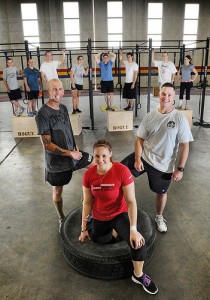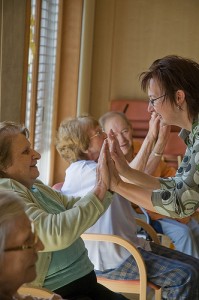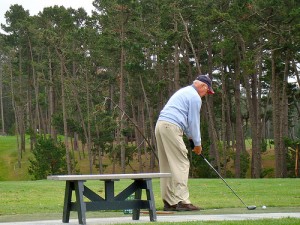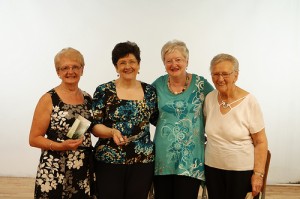Today I have an interview for you from Dan Ritchie on keys to personal training baby boomer clients.
Enjoy!
Rick Kaselj: Ok. So what would be the one thing that fitness professionals could do right now to make their fitness business more appealing to baby boomers?
Dan Ritchie: One that they could do to make their business more appealing is to focus more on their educational experience.
In our facility, we focus on the number of college degrees, graduate degrees and Ph.D. We focus on that expertise because baby boomers kind of appreciate that. They often tend to want the best.
They are willing to pay a little bit more for personal training if they know they are going to the best. Now if you don’t have a degree, that then means that finding a way to highlight your expertise.
Search for certification or educational program you’ve gone through or even if they just got really knowledgeable in an area. For example, you take one of Rick’s shoulder pain programs on how to solve shoulder issues.
A lot of older clients have rotator cuffs and shoulder issues. So just like going to someone who can say I can help you with your shoulder issues because I ventured on these educational courses that are going to pay more attention to you. This person really has the knowledge and expertise to help me.
Education is one of the biggest things I think helps us seperate ourselves from all other facilities around us that are very general. It helps us to be able to realize that these guys specialize in helping people my age. They spoke to us, they are educated, and they are knowledgeable.
I feel that really helps differentiate you from all the other facilities around. You do have to spend some time in your marketing and your message, and you communicate it to them saying, “Hey, I’m an expert in Shoulder Movement” or “I’m an expert on how to help someone with their golf swing”.
That will get the baby boomers attention because they are saying “hey I’m having pain while playing at the golf club and that’s what I want to do for the next 20 years. You have to find something that differentiate you and that makes you stands out in the market place so baby boomer will say “yeah, this is the trusted expert that told me what I need”.
Rick Kaselj: That brings us to the next point the specialization, something that I have preaching a lot because more and more people are going into fitness. It could be their primary career or secondary career in order to help yourself stand out you need to specialize in some sort of area and really show that you are the expert. I like the fact that a big push has been, you don’t need a degree, but if you do have one really utilize that and highlight it. Show that it is a differentiator from you from everyone else, that’s a really good point.
 Dan Ritchie: Definitely, because we are in here in the West Point, Indiana. We only hire trainers with degree which I don’t think necessarily makes them a great trainer but we set ourselves above everyone else in our area by just saying that all our trainers have degree and no others can make that claim.
Dan Ritchie: Definitely, because we are in here in the West Point, Indiana. We only hire trainers with degree which I don’t think necessarily makes them a great trainer but we set ourselves above everyone else in our area by just saying that all our trainers have degree and no others can make that claim.
Because of that, a lot of our trainers are in a higher level. Obviously, there can be great trainers that don’t have a degree but if you have a degree or specialization or certification, play that up and highlight that so people realize that you are taking your industry seriously and you are trying to be the best that you can so people realize that you are an expert of what it is that you do.
Rick Kaselj: Maybe you can expand a little bit. I know we were talking about it at a meeting in Las Vegas. You talked about how your business really changed when you started focusing on baby boomers and started to focus on an exclusive personal training. Maybe you can share with us a little bit about that transition and why you ended up going from a general membership based club to focusing on baby boomers and really just having a close door personal training studio?
Dan Ritchie: That’s a good point. We started out the first 3 years of our operation basically just running as a small health club. We really catering and marketing to baby boomers and seniors and our thought was that they would train with us and we thought that it will be done by personal training and that was a mistake.
After 3 years, we said baby boomers and seniors are realizing that they need as much as personal training as they do it. So we made a switch and we said if you are going to work with us, you going to personal train with us to do 3-4 times a week.
So we just made a switch and that was really successful because what we found was most baby boomers and seniors, people from 50 to 80 years old, don’t have a tremendous exercise background. They haven’t worked out hard. In fact many of the women their era is pre-titled nine and so they didn’t play sports in high school. In fact the concept of sweating is almost a cultural paradox.
A number of women that I trained that are in their 70’s said ” oh, were not supposed to sweat”, because they came from the time period when girls were encourage to not play sports which is unfortunate.
We realized that they were coming to the health club but not really exercising. They were coming in and maybe ride the bike a little bit and do a few exercises but they were not really getting those changes that they want and that we wanted for them. We found when we started selling training practices with membership included the results were way different. Clients were way more satisfied.
We got a lot more significant improvements in just a number of avenues. We got more people that really focus on life changing results. Can you do the health club model to baby boomer? Absolutely! But I find mostly people actually need more training than people that are young because they have a lot of medical conditions.
They may have hip replacements, knee replacements, rotator cuff injuries, heart conditions, arthritis, you name them all, so they need a lot more guidance than an average 20 years old that can just run into a health club and learn how to work out pretty hard.
The personal training I think is even more important for someone older in their 55 and we encourage more personal trainers to really look into the older clients because I think that’s where the industry’s going to shift.
The money goes upward and more and more people in the age of 60 retire and they have lots of financial resources, you will going to have more and more clients coming to you in their 60’s and 70’s and if you are not prepared for that you are going to flounder in the industry.
Rick Kaselj: It’s interesting your story on how your club changed and how you made personal training mandatory and that ended up leading to better results. Now one thing is that I’m up in Canada and I know what Title Nine is, because I was in a cycling trip in Boulder, Colorado and a friend explained to me the whole story. Maybe you can briefly explain what that is?
I will cut it off there. I will have part 2 of the interview, very soon.
Thanks for reading.
Rick Kaselj, MS
.



